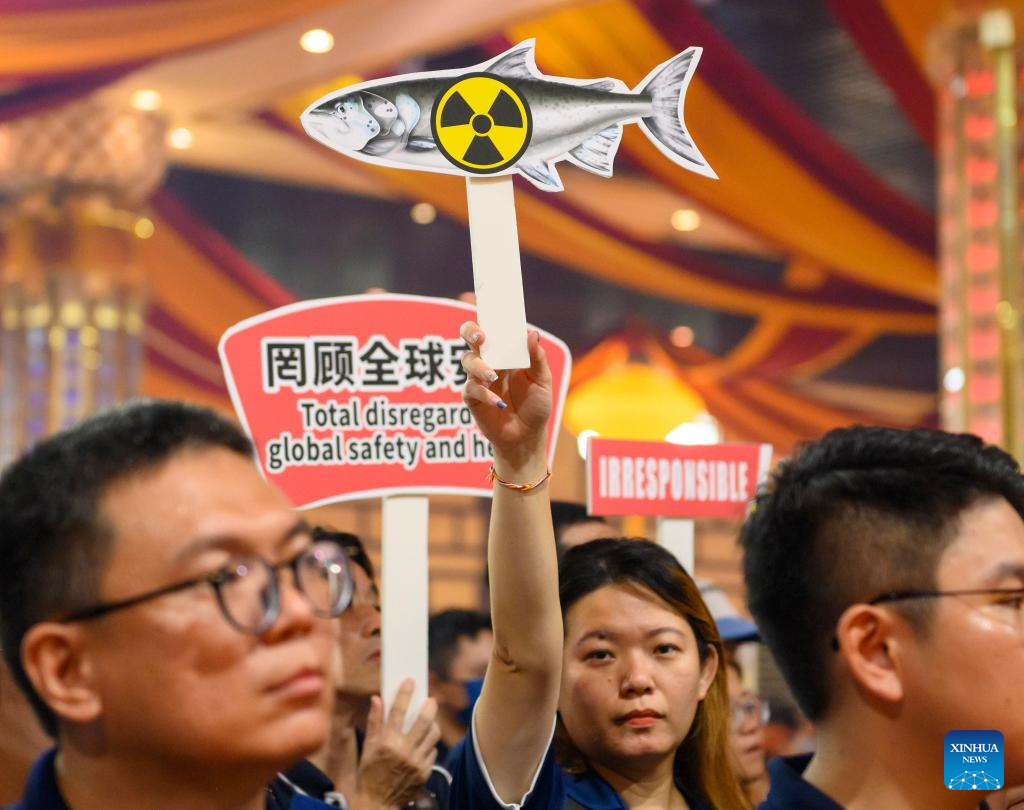Tokyo can't pass the buck for its dirty deed: China Daily editorial

People attend a rally against Japan's dumping of nuclear-contaminated wastewater into the ocean in Selangor state, Malaysia, Aug 27, 2023. [Photo/Xinhua]
Despite strong condemnation from the international community, Japan started to discharge nuclear-contaminated wastewater from the Fukushima Daiichi nuclear power plant on Thursday. Knowing clearly that it is doing the world a wrong, the island country has abandoned rational communication and crafted various plots to shift the blame onto others.
According to Japanese media reports, Deputy Foreign Minister Masataka Okano has summoned China's Ambassador to Japan Wu Jianghao to protest a series of harassing phone calls coming from China over Fukushima. Yet it is the Chinese embassy and consulates in Japan that have been the targets of harassing phone calls from inside Japan.
This is just the tip of an iceberg as the Fumio Kishida government has devoted most of its energy to smearing other countries for criticizing its move. It has shown no inclination to reflect upon why it is subject to criticism, let alone heed the legitimate concerns over the potentially disastrous consequences of it dumping the toxic water into the ocean.
The Fukushima nuclear accident is one of the world's most serious nuclear disasters. As a result, the toxic water is known to be contaminated with more than 60 kinds of radioactive elements. No existing viable technology can remove all these nuclides. Those that remain will be dispersed by the ocean currents, posing risks to the marine ecology and human health.
Even though the International Atomic Energy Agency said in a review in July that Japan's plan was "consistent with international safety standards," Japan cannot take this as a green light to proceed with its flaw-ridden plan.
In fact, the IAEA report has raised further questions and doubts rather than quelling concerns. Japan has yet to prove the legitimacy and legality of its ocean discharge decision, the long-term reliability of the purification facility, and the authenticity and accuracy of its nuclear-contaminated water data.
Even though there are other viable options for dealing with the wastewater, the Japanese government has obviously chosen the most irresponsible way, which is cost-efficient for itself but poses the severest danger to others. It is only natural that Tokyo should face the current wave of opprobrium even from its own people. The Japanese government plans to dump more than 1.3 million tons of nuclear-contaminated water at the defunct nuclear plant into the sea, meaning human beings, Japanese people included, will live under the dark shadow of its actions for over 30 years; even countries that are far away from Japan will be affected.
By shifting its own troubles onto others, Tokyo is seriously infringing upon the rights of people in all countries to health, development, and a safe environment. The Japanese government must return to sense and listen to the concerns of all stakeholders. Otherwise, the current backlash is just a beginning.
Photos
Related Stories
- S. Korean opposition party rallies against Japan's nuke wastewater dumping
- US endorsement cannot justify nuclear-contaminated water discharge: Foreign Ministry
- Ukrainian president, Japanese PM discuss security guarantees over phone
- We must be highly vigilant of Tokyo's ill intentions
- World reminded Fukushima nuclear disaster continues
- Commentary: Global community must stop Japan dumping nuclear-tainted water
- Japan's jobless rate climbs to 2.7 pct in July
- Japan is employing despicable means to shift blame onto China
- Chinese industry group calls for boycott of sea cucumbers from Japan amid wastewater dumping concern
- Japan's credibility deficit will only be further expanded
Copyright © 2023 People's Daily Online. All Rights Reserved.









